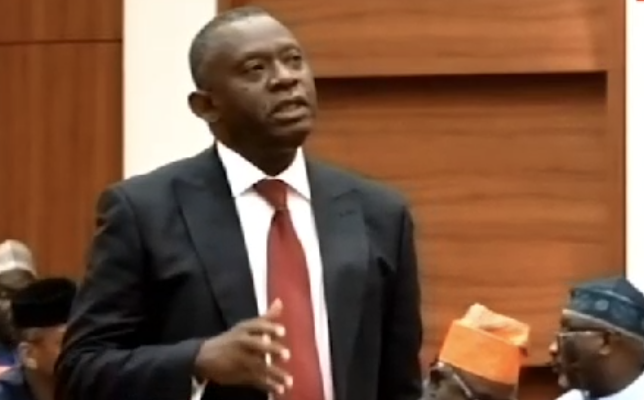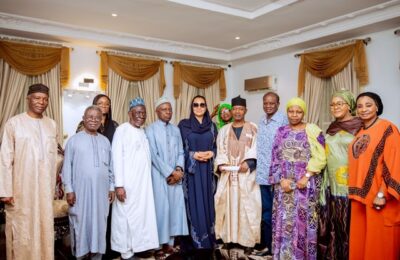By Ralph Omololu Agbana.
Chairman, Committee on Senate Services, Senator Sunday Karimi (Kogi West) has described the Tax Reform and Regional Development Commission Bills as the best things to happen to Nigeria in present time.
Karimi made the declaration when he appeared as a guest of TVC News programme: ” This Morning” , at the weekend.
Responding to questions on the primary achievements of the 10th Senate, Karimi was resolute that the upper Legislative Chamber has done well even though they are not excellent.
Half-way mark into the current four-year legislative tenure, which commenced in June, 2023, the lawmaker noted: “We have done good—I am not saying we are excellent. Our objective from the start is to engage with the executive to achieve great things for our nation and not to be confrontational”.
This approach, he enthused, has been an “interesting engagement” because President Bola Tinubu, Vice-president Kashim Shettima and the First Lady, Senator Remi Tinubu at various times were members of the Upper Legislative Chamber.
Responding to the level of cooperation between the legislative and executive arms, why the latter seems to be so comfortable and why it never failed to always get what it asked for, Karimi said, “Our people are our constituents. We are representing the grassroots, we are representing the masses of this country; so when I say our people, these are those I am referring to, people in the upper class are also our people but we care more for the grassroots. So, our aim from the beginning is how we can work with the executive to get the best for our people. I wouldn’t say they’ve always gotten what they asked for. Right from the ministerial screening, the president brought a list of ministers. We screened all of them and we rejected some despite the fact that they are nominees of Mr President. Those that are talking about “rubber stamp”, they don’t know what they are saying. We’ve had issues of not being on the same page (with the executive), but we negotiate the middle-term approach. Let’s talk about the last budget, the Ministry of Budget and Mational Planning gave the president an impression that all these issues of constituency projects are a waste, that the president should do away with it. Let me tell you— constituency project is the best way to reach the grassroots. They don’t give us this money, they only give us the opportunity of suggesting projects into the budget. The President wanted to stop it totally based on the advice given to him, but the leadership of the National Assembly negotiated with him. We told him that, ‘Mr President, if you are going to stop (constituency projects), you are going to be at Loggerheads with the NASS’. Because this is the only way that we are able to reach out to our people, in terms of giving them dividends of democracy, in terms of (people oriented) projects, in terms of infrastructure. For more than two weeks, the president was (adamant), but at the end of the day, he understood and allowed constituency project to remain. It has been there since 2000″.
The lawmaker admitted to the fact that Nigerians generally hold a negative perception of the activities of the national assembly and the legislature as a whole, including misunderstanding the importance of constituency project.
He streesed the importance of constituency projects in the legislative business with reference to the construction of new 75 solar-powered boreholes and the rehabilitation of another 60 moribund water schemes across communities in Kogi West— valued at N1. 24 billion, which he facilitated.
He said, “Let me talk about my constituency in terms of constituency projects; ask my people; what constituency project has brought to them. I can name it. When I was in the House of Representatives, my people called me Mr Water. I made sure every community in my federal constituency had access to portable water, I made sure there is one water supply system in every community, it can be motorised or solar powered boreholes, and I am continuing that now. Communities that have poor power supply, I gave them transformers and solar powered street lights. Talking about my own personal projects, I am doing a yearly (N100m) bursary awards (of N100,000 each to 1000 students) in public tertiary institutions across seven local governments in Kogi West Senatorial District
My colleagues are reaching out to their constituencies in different ways because you cannot know the problems of our people more than us; because we are the ones representing the grassroots. Some are doing roads. Part of my project this year, I put money (in the budget) for federal roads; some of these road (contracts) were awarded years ago, and they are not properly funded. I put N2bn (for the construction of) the worst parts of these roads and i put it under the Federal Ministry of Works and the Minister is cooperating. In fact, the (contractors are going to mobilize to the site) in the next one, two, three weeks”.
Speaking generally on the economy, Senator Karimi said the Tax Reform Bill remains one of the best things to happen to the country. The problem that was created when this tax reforms bill was brought, you will think Nigeria was about to fall (apart). Even governors of APC states, they condemned it. The President was accused of wanting to satisfy Lagos and all that. I’m a member of the Finance Committee of the Senate. The tax reforms bill is one of the best things that has ever happened to this nation. You know what it is going to bring to us? We are going to have states competing with each other on revenue generation because the more revenue you are able to generate, the more that will accrue to you. We are not just going to have the situation where some states will just sit down and be expecting manna from the centre. No government, before now, has been able to thinker with the tax reforms to encourage the states in the fedrating units to compete and bring more revenue.The bill is almost being done with. Before we go on break in August, I believe we’re going to get the tax reforms bill passed into law. We have worked hard on it, all governors across the federation are now on board, they now see reason why we have to pass it, they now see reason why it will benefit their states; they now see the sense in what Mr President has done. And on this work, we cooperated with the executive, we did a lot of groundwork reaching out to the states, we did public hearings where various interest groups came and participated”.
He continued “People are talking out of the context of that bill. I am not saying we accepted everything inside the bill wholesome; we made amendments in some areas. Our report in the senate is almost completed, I’m sure the House of Reps they are almost done with their report, I’m sure by the time we resume, where we still have grey areas between the House and the Senate, we will sit and harmonise. In the next two to three months, we’re going to have the tax reforms bill passed into law”.
Speaking on the new National Anthem Bill, he said the old Natiomal Anthem “Arise o Compatriots”, which was introduced by the military junta, was justifiably recommended for replacement with the original anthem by President Bola Tinubu.
“I’ve told you the objective of the 10th Assembly under the leadership of the Senate President, His Excellency Godswill Akpabio and House of Representatives speaker Rt Hon Tajudeen Abbas is not to fight the executive over nothing but to dialogue on how to move the nation forward. Mr President gave reasons why he wanted us to go back to what it was from the beginning; that the (original) Anthem will bring Nigerians together the more. He wanted to create a new national orientation and we agreed with him. We debated it. What (people) don’t understand is that there are some issues, instead of debating publicly, we go into executive session. Instead of going into plenary, arguing and shouting at each other—some contentious issues we go into executive session to debate it there; and when we are done arguing at the closed session we go back to the plenary because all the issues they’ve been resolved at the close session”.
Asked to comment on contemporary issues he considered to present the most difficult time in the life of the 10th National Assembly, he quickly pointed to the National Minimum Wage crisis and the attendant threats of nationwide industrial action by the labour leaders.
He argued that contrary to negative perception among the public, federal lawmakers prioritise the interest of the masses.
“We are concerned about people you called ordinary men. They are our people that elected us, without their votes, we would not have been there today and we are doing all that we can do to make their lives better. Let me tell you where we started from, this government (when it came on board) the economy was really bad, I don’t want to put the blame on any past government, but it was really bad. We got to the situation whereby to survive, we had to be printing Naira. You know, when the government starts printing currency, that means that they no longer (have ways and means) to fund the activities of government. That was where we took over from. When this government came, they had to stop that. The foreign capital investment was almost nill. Nobody was ready to come and do business with us. So, this government came in, they had to create a new order and that brought a lot of hardship to the citizenry. The president took the bold step by stopping fuel subsidy, which had become a drain pipe on our economy for long. The fuel they are using in our neighbouring countries was being subsidised by Nigeian government and that’s the way we’ve been living. The president put a stop to it and that brought about high cost of living, but he had to do that to save our future and we cooperated with him. Because of the high cost of living, the labour came up with the protest that the wage bill was low, we had to work with the labour, work with the executive (and) we immediately passed the national minimum wage bill. (So, this is to tell you that it is not true that we are not there for our people) as some people are saying. The President also brought TETFUND, educational loans so that students can approach TETFUND to take loans (to support their education) “
On general insecurity, he said ” The basic responsibility of the government is security of lives and property of the citizens. The security challenges that we have in this nation didn’t start with this government— I’m not excusing this government from (its responsibility)—it started as far back as 2003 from Borno State and Yobe State but is now all over the nation. We have a situation where our people are not able to go to the farm. It has also affected food security and it is everywhere all over the country. As representatives of our people, we have discussed this issue (of insecurity) severally. Lately, we set up a committee of the National Assembly to conduct public hearings, nationwide, it might be zonal public hearings in the six geopolitical zones and it may even go further down. The purpose is how we can solve this problem permanently. These people (Boko Haram and violent herdsmen) are Nigerians, although some of them have been infiltrated by other nationals causing havocs for our people but some people here are also collaborating with them. We cannot allow that to continue, let’s face the reality. We don’t want to have a situation where we have ethnic warlords all over the country But this government is also doing a lot because at a time, it reduced. If ypu look at the ones in Birnin Gwari-Kaduna State, the ones in Niger State, the ones in Zamfara State, where it was really bad, they’ve being dislodged and those places are now relatively safe, but they have now moved to some parts of the middle belt. It is a lot of challenge for our nation. A lot of funds that will have been used for developmental projects are being spent (to fight insecurity). The South West came up with their own Amotekun (local security outfit) and other zones also did their own, but we are not there yet. Nobody is happy about it but is still the responsibility of government to solve the problem”.
In terms of looking inward to boost the economy, Karimi said the government is doing a lot to curb illegal mining in order to preserve and maximise the potential of the country’s mineral resources. “A lot of foreigners are mining our resources; gold, lithium, etcetera, we are working on a law that will put a check to this for the maximum benefit of our country. We are working closely with the executive on this, and we will soon come out with a blueprint on it. “
Another major achievement of the 10th National Assembly, he noted, is the establishment of regional development commissions.
He emphasised that the regional development commissions is the baby of the 10th National Assembly, which ceme with the law that each of the six geopolitical zones has a development commission to accelerate infrastructure development within each zone.
“The (Regional Development Commission Bill) is the creation of this 10th National Assembly, It is not the creation of the executive. We (enacted it) and the president accepted it. In this year’s budget alone about N170bn was earmarked for each of the six commissions. You are going to see a lot of developmental projects going on all over the six geopolitical zones”.
Karimi, however, dismissed questions relating to his suspended colleague and fellow Kogi lawmaker, Senator Natasha Akpoti-Uduaghan saying her issues were irrelevant to the discussion, which focused on the achievements of the national assembly and national development. He downplayed the trending news around the Kogi Central Senator describing the events as nothing but mere distractions and side attractions, which, according to him “is not the best for the national assembly as an institution, and we’ve got to move beyond this.”




